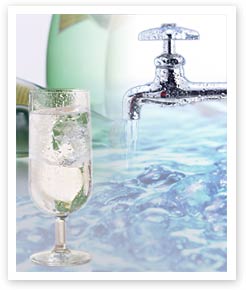|
|
 |
 |
With the growing interest in food and nutrition, some people
use bottled mineral water to make tea. One must take care,
however, as some types of water are not suitable for making
tea.

1. Hard water and soft water
Mineral water is often taken from underground water and therefore
contains dissolved minerals from the soil. The density of
calcium and magnesium dissolved in the water is called hardness.
Hard water is water with a high degree of mineral density
and soft water is that with a lower degree. Most imported
mineral waters are hard water and most domestic ones are soft
water.
2. Which is suitable for tea
It is said that soft water is generally more suitable for
green tea. Hard water cannot make the most of the taste and
aroma of the tea. Additionally, hard water can turn cloudy
and produce an unpleasant look. Tap water, therefore, often
makes better tea than hard mineral water. If, however, you
wish to use mineral water, domestic mineral water is recommended.
Check the ingredients on the label to ensure that the calcium
content is less than 200 mg per liter.
3. Boiling water
The taste of the tea also depends on the method of boiling
water. Thoroughly boil tap water with the lid of the kettle
open in order to remove the smell of chlorine. Boiling water
for an excessively long period completely removes the air
dissolved in the water and is not good for tea. This air,
when retained, provides for good aroma and a refreshing taste.
If the water has a strong smell of chlorine, measures should
be taken to remove the odor, such as leaving the water in
a container overnight or using a water purifier.
|
|
|